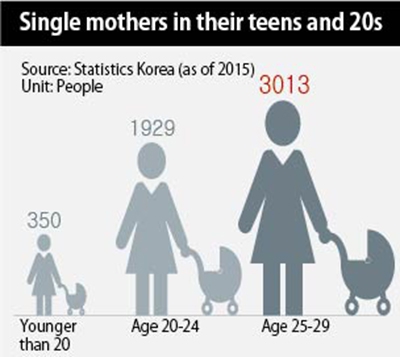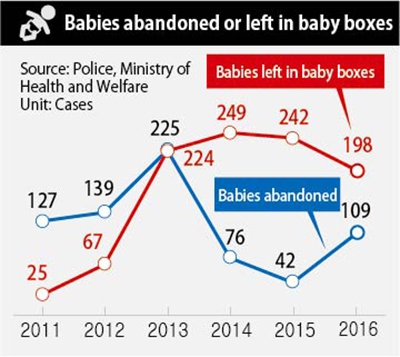 |
|
A young single mother takes care of her baby at the Comfortable House in the Gwangsan district of Gwangju City on Jan. 31. The facility houses 10 single mothers. (by Jung Dae-ha, Gwangju correspondent)
|
Eliminating social prejudices is critical for reducing instances of infant abandonment
Early in the morning on Jan. 30 in an apartment in the Duam neighborhood of Gwangju, a 26-year-old woman woke up to a baby bawling. Walking into the living room, she found her 24-year-old younger sister “A” cradling a newborn. “Whose baby is that?” the older sister asked. “I brought the baby in because it was crying outside the front door,” A said. Believing this story, the older sister reported the baby to the police hotline (112) and the emergency hotline (119). But after the police started their investigation, A broke down and confessed. “The truth is, that baby is mine,” A said. She had given birth to the baby alone in her older sister’s bathroom in the middle of the night. A, who is unmarried, is currently taking a leave of absence from her junior year of college. The police said that since A did not actually abandon her baby, they would not press charges against her for neglect of an infant. A’s family will reportedly be taking care of the baby. Why would A have told a lie about bringing in a newborn abandoned in the apartment hallway? It was probably because A felt the same fear and desperation felt by most unwed mothers. The news that a woman has gotten pregnant or had a child out of wedlock imposes severe discrimination and financial hardship. As a result, eliminating the social prejudice about single mothers is critical for reducing infant abandonment. “When my son went to an orientation before enrolling in elementary school, he was still afraid of getting looks from people because he has the same last name as his mother,” said a woman surnamed Noh, 27, who is raising a seven-year-old boy by herself in Gyeonggi Province. (In South Korea, it’s customary for children to use their father’s last name, while women retain their maiden name even after marriage.) There are calls for society to embrace single mothers. “I couldn’t tell my family that I was pregnant, but I also wasn’t about to raise the child by myself,” said “B,” a 17-year-old woman who spoke with the Hankyoreh on the afternoon of Jan. 31 at Comfortable House, a welfare facility for single mothers and their children in Gwangju’s Gwangsan District. B, who dropped out of middle school because of family issues, has a six-year-old daughter. While she was living in Gyeonggi Province, she met a 29-year-old man in an online chatroom. When she got pregnant, she was initially at a loss but decided to keep the child. “I gave birth at a temporary shelter for babies and was planning to give my baby up for adoption, but this video I saw about adopted boys just broke my heart. I didn’t want my daughter to have to feel that way,” B said. More than 20% of single mothers are in their teens and twenties
 |
|
Single mothers in their teens and 20s
|
 |
|
Babies abandoned or left in baby boxes
|







